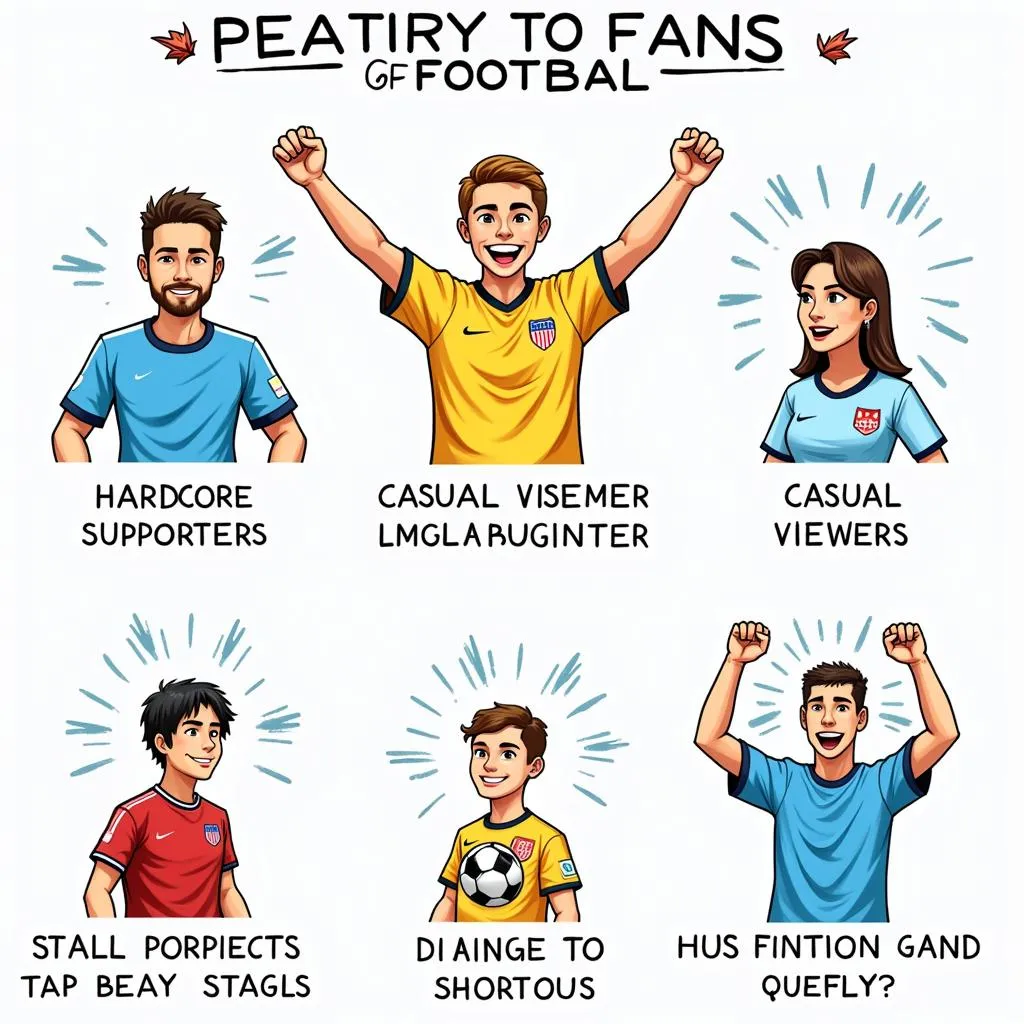This article will delve into the concept of “off-fans” in football, a term often used to distinguish between casual fans and hardcore, passionate supporters. We’ll explore the different types of off-fans, their characteristics, and why they might choose to follow football. We’ll also touch on the impact of off-fans on the sport and how their presence shapes the football landscape.
So, what exactly is an off-fan? In the simplest terms, an off-fan is someone who is not a dedicated, die-hard fan of a particular team. They might be casual viewers who enjoy watching football matches but don’t necessarily follow a specific club or player religiously. This doesn’t mean they aren’t invested in the sport or don’t appreciate its intricacies. Instead, their interest might be more generalized, focused on the spectacle of the game itself or certain aspects of the sport like tactics or individual players.
Types of Off-Fans:
Off-fans can be categorized into different types based on their reasons for following football:
1. The Casual Viewer: This type of fan enjoys watching football matches, especially high-profile games or major tournaments. They might be drawn to the excitement and drama of the sport but don’t necessarily follow a specific team or player. They often watch games for entertainment purposes and might engage in discussions about the matches but rarely get deeply involved in the world of club football.
2. The Tactical Analyst: Some off-fans are captivated by the tactical intricacies of the sport. They are fascinated by formations, strategies, and how teams approach different situations on the pitch. They might study tactics, analyze game footage, and follow the work of renowned coaches. This interest goes beyond casual viewing, diving deeper into the technicalities of the game.
3. The Player Admirer: This type of off-fan might not follow a specific team but instead gravitates towards a particular player or group of players. Their interest lies in their skills, performances, and the individual stories behind the athletes. They might follow these players across teams and leagues, remaining invested in their careers regardless of their club affiliation.
4. The Trend-Follower: In recent years, the rise of social media and online communities has created a new category of off-fans. This group is influenced by trending topics, viral moments, and online discussions about football. They might not have a deep understanding of the sport but participate in conversations about the most popular teams, players, and events.
Why Do People Become Off-Fans?
There are various reasons why individuals might become off-fans instead of hardcore supporters:
1. Lack of Local Team: For individuals living in areas without a professional football club, following a specific team might be challenging. They might choose to be general fans of the sport without a local allegiance.
2. Time Constraints: Living a busy life with family, work, and other commitments can make it difficult to dedicate significant time and energy to following a particular team. Casual viewing becomes a more accessible way to engage with the sport.
3. Disillusionment with a Team: Past experiences with a particular team, like poor performances, lack of success, or changes in management, can lead fans to become disenchanted with their team’s performance and choose to distance themselves from hardcore fandom.
4. Enjoyment of Different Aspects of the Sport: Some individuals are drawn to specific elements of football, like tactics, player stories, or the global spectacle of major tournaments. They might not have a strong attachment to any particular team but find value in these aspects of the game.
The Impact of Off-Fans:
While off-fans might not be die-hard supporters, their presence has a significant impact on the sport:
1. Increased Viewership: The casual viewer demographic contributes significantly to viewership figures, particularly during major events like the World Cup or Champions League matches. This broader audience brings in new revenue streams for clubs and leagues through television rights, sponsorships, and merchandise sales.
2. Wider Awareness: Off-fans, through their conversations and online activity, can spread awareness of the sport to new audiences, broadening its appeal and attracting new fans to the sport.
3. Diversity of Opinions: The diverse perspectives and viewpoints of off-fans contribute to a wider range of discussions and debates surrounding the sport, creating a richer and more multifaceted fan culture.
4. Global Reach: Off-fans from different countries and cultures create a more global and diverse fan base for the sport. This international audience contributes to the global reach of football and its associated products, brands, and events.
Conclusion:
Off-fans are an integral part of the football landscape, contributing to the sport’s popularity, revenue generation, and diverse fan culture. Their presence expands the reach of football, creating a broader audience and stimulating discussions about the game. Although their level of dedication might differ from die-hard supporters, they contribute significantly to the sport’s growth and development.
 Different types of football fans
Different types of football fans
While off-fans might not follow the sport in the same way as hardcore supporters, their contributions to the sport’s popularity, revenue, and diversity are undeniable. They add another layer to the rich tapestry of football fandom.
Frequently Asked Questions:
1. What is the difference between a hardcore fan and an off-fan?
A hardcore fan is deeply invested in a particular team, attending matches regularly, following every game, and actively engaging in the club’s community. An off-fan enjoys the sport but might not be as committed to a specific team.
2. Are off-fans less important than hardcore fans?
Not at all! Off-fans contribute significantly to the sport’s growth and popularity, expanding its reach and bringing in new viewers and revenue.
3. Can off-fans become hardcore fans?
Absolutely! Sometimes, a casual interest can blossom into a deep passion for a team or player. The spark can be ignited by a memorable match, a captivating player, or a newfound connection to the sport.
4. Do off-fans have a negative impact on football?
Not necessarily. While some might argue that their lack of dedication detracts from the “spirit” of the game, their contributions to the sport’s financial success and diverse audience are undeniable.
5. Are off-fans a growing demographic?
The rise of social media and globalized sports coverage suggests that off-fans are likely a growing demographic. Accessibility to the sport through online platforms has broadened its appeal to new audiences, contributing to this trend.
 Impact of different types of fans on the football industry
Impact of different types of fans on the football industry
If you’re curious about the world of football, feel free to explore our website for more articles and insights on the sport. We cover various topics from player profiles to tactical analysis, providing something for all types of fans, whether you’re a seasoned supporter or a casual viewer.
For any queries or suggestions, please feel free to contact us at: fansbongda@gmail.com
We’re always excited to connect with fellow football enthusiasts!


